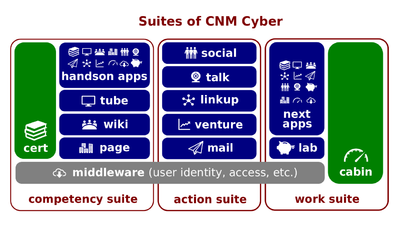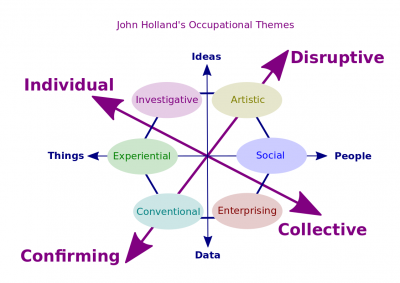Difference between revisions of "Nature of Occupations"
(→Outline) |
|||
| Line 14: | Line 14: | ||
!#!!Referred topics | !#!!Referred topics | ||
|- | |- | ||
| − | ![[What | + | ![[What Occupation Is]] |
|1|| | |1|| | ||
|- | |- | ||
| − | ![[ | + | ![[Occupation Lists]] |
|2|| | |2|| | ||
|- | |- | ||
| − | ![[ | + | ![[Occupational Themes]] |
|3|| | |3|| | ||
| − | |||
| − | |||
| − | |||
|} | |} | ||
Revision as of 03:17, 30 April 2020
The Nature of Occupations (hereinafter, the Lesson) is the lesson of CNM Cyber that introduces its participants to CNM Cyber Orientation. The Lesson belongs to the Introduction to Employment session of the CNM Cyber Orientation.
The Lesson is made up of three lectios. At CNM Cyber, the word, lectio, is used for a lesson part.
Summaries
Predecessor
- The predecessor lesson is Industries and Specialties.
Outline
Nature of Occupations Lectios # Referred topics What Occupation Is 1 Occupation Lists 2 Occupational Themes 3
Successor
- The successor lesson is Work Environments.
See also

Nature of Occupations is the third lectio (or lesson part) in the Introduction to Employment lesson. The lesson itself is the second in CNM Cyber Orientation. Consequently, the Orientation is the first stage of WorldOpp Pipeline.
This wikipage presents its full script and those test questions that are related to that lectio.
Nature of Occupations
- Main wikipage: Nature of Occupations; video (6:09)
- Occupation. The regular activity that a person undertakes to earn his or her livelihood. That activity can be a job, profession, or position that somebody works in. Entrepreneurs may acknowledge their occupation as self-employed.
- Occupational Information Network. A free web-based resource that contains data for various occupations that can be helpful for students, job seekers, businesses and workforce development professionals to understand today's world of employment in the United States. It particularly uses Holland Occupational Themes in its "Interests" section.
- Occupational Outlook Handbook. A publication of the United States Department of Labor's Bureau of Labor Statistics that includes information about the nature of work, working conditions, training and education, earnings and job outlook for hundreds of different occupations in the United States.
- Occupation list. Any attempt to classify various occupations. No one can be considered 'complete' or 'final.'
- Assistant. Someone who helps someone else to do a job. As an adjective, this term can also be used to indicate that someone holds a less important position in an organization than another person without this adjective, assistant, in his or her job title.
- Clerk. Someone who works in an office, dealing with records and/or performing general customer support and/or document management duties.
- Consultant. Someone who advises other people and/or enterprises on one or more particular subjects. A consultant can also be defined as a specialist and social worker combined. Advanced consultants tend to be subject matter experts on the one hand and skilled in working with people on the other hand.
- Laborer. Someone who does physical work, which requires those KSAs that can be learned fast and easily.
- Manager. Someone who achieves those goals that are assigned to him or her through his or her subordinates.
- Operator. Someone who makes something like machinery or other equipment work or puts something into action.
- Originator. Someone who creates and shapes new concepts, as well as makes them real or participates in the developments of real deliverables often as a product owner.
- Service worker (social service worker, pink-collar worker). Someone whose labor is related to social interaction and/or other service-oriented work. Service workers can be engaged in customer support, entertainment, sales, social work, etc.
- Specialist. Someone who has significant experience, knowledge, or skill in a particular subject.
- Technician. Someone whose job is to make sure that machinery, other equipment, and pieces of technology such as laboratories work correctly, which may include making them work if they don't.
- Trades worker. Someone who is practically skilled in some area of advanced physical work like carpentering, construction, equipment installing, plumbing, printing, and welding, carries out his or her work by hand and has learned his or her skill completely or primarily on the job in at least one year and, usually, from some mentor.
- Holland Occupational Themes. Consultant, manager, specialist.
- Experiential occupation (realistic occupation, motoric occupation). An occupation that frequently involves work activities that include practical, hands-on problems and solutions. They often deal with plants, animals, and real-world materials like wood, tools, and machinery. Many of the occupations require working outside and do not involve a lot of paperwork or working closely with others. Examples of that type of occupations may include a carpenter, engineer, farmer, operator, technician, tester, and trades worker. Collectively, they may be called "doers;" in ancient times, they would have been hunters.
- Investigative occupation (intellectual occupation). An occupation that frequently involves working with ideas and requires an extensive amount of thinking. These occupations can involve searching for facts and figuring out problems mentally. Examples of that type of occupations may include an auditor, business analyst, compliance officer, cost estimator, editor, inspector, interviewer, and lawyer. Collectively, they may be called "thinkers;" in ancient times, they would have been shamans.
- Artistic occupation (esthetic occupation). An occupation that frequently involves working with forms, designs and patterns. They often require self-expression and the work can be done without following a clear set of rules. Examples of that type of occupations may include an artist, composer, creative writer, designer, enterprise architect, and originator. Collectively, they may be called "innovators;" in ancient times, they would have been artisans.
- Social occupation (supportive occupation). An occupation that frequently involves working with, communicating with, and teaching people. These occupations often involve helping or providing service to others. Examples of that type of occupations may include a career counselor, job coach, mediator, sales representative, service worker, and teacher. Collectively, they may be called "helpers;" in ancient times, they would have been healers.
- Enterprising occupation (persuasive occupation). An occupation that frequently involves starting up and carrying out projects. These occupations can involve leading people and making many decisions. Sometimes they require risk taking and often deal with business. Examples of that type of occupations may include an architect, product owner, and self-employed. Collectively, they may be called "creators;" in ancient times, they would have been leaders.
- Conventional occupation (conforming occupation). An occupation that frequently involves following set procedures and routines. These occupations can include working with data and details more than with ideas. Usually there is a clear line of authority to follow. Examples of that type of occupations may include an accountant, assistant, bookkeeper, clerk, document management specialist, laborer, and technical writer. Collectively, they may be called "organizers;" in ancient times, they would have been guardians.
Script
The video of the presentation is published at https://youtu.be/bVNQOFVsPyQ (6:09). Here is its full text.
Overview
- Welcome to Nature Of Occupations. In this brief presentation, we are going to take a look at natures of various occupation and the most popular attempt to classify them called Holland Occupational Themes. Let's go ahead.
What an occupation is
- Occupation is a regular activity that a person undertakes in order to earn his/her livelihood. An occupation theme can be defined as the unifying subject of the type of an occupation. The subject impacts preferences for work environments and outcomes. Here there is no any single classification of different things or types of occupations.
John Holland's Occupational Themes
- The most popular came from the works of an American psychologist John Holland. He tried to match occupations with personalities and he studied personalities first and he found that some personalities are more disruptive, some are more conforming, some are more individual, some are more collective and he chunked personality types in six buckets which are artistic, social, enterprise, conventional, experiential and investigative. Every personality has not only one dimension but could be two or more and as the personality classification didn't really work but for occupations basically became the most popular classification.
Experiential occupations
- Starting with Experiential potential. Initially drawn a horn called it motoric occupation and later he changed it to realistic occupation. Evidential potential is any occupation that frequently involves work activities that include practice hands on problems and solutions and in this bucket came a carpenter, engineer, farmer etc. Collectively they may be called doers, in ancient times they would have been hunters.
Investigative occupations
- Investigative occupations which John Holland initially called intellectual is an occupation that frequently involves working with ideas that requires an extensive amount of thinking. In this bucket goes an auditor, business analyst, compliance officer, cost estimator, editor, inspector, interviewer and a lawyer. Collectively they may be called thinkers.
Artistic occupations
- In artistic occupation, initially known as esthetic occupation is the occupation that frequently involves working the forms, designs and patterns. In this bucket will go an artist, composer, designer, enterpriser, architect and a creative writer. Collectively they may be called innovators. In ancient times they would have been artisans.
Social occupations
- Social occupation or initially it was called supportive, is an occupation that frequently involves working with and communicating with and teaching people. This occupation often involves helping or providing services to others. In this bucket will go a carrier councilor, job coach, sales representative and teacher. Collectively they may be called helpers and in ancient times they could be deemed healers.
Enterprising occupations
- Enterprise Occupation, initially it was called persuasive occupation. It is an occupation which frequently involves starting up and carrying out projects. In this bucket will go an architect, project owner and self-employed. Collectively they may be called creators and in ancient times they would have been leaders.
Conventional occupations
- Finally, Conventional Occupation, initially known as conforming. This is an occupation that frequently involves following set procedures and routines. In this bucket will go an accountant, administrative assistant, book keeper, document management specialist and technical writer. Collectively they may be called organizers. In ancient times they would have been guardians.
Sets of dimensions
- Here are two different sets of dimensions, one is working ideas verses data and people verses things and clearly social works more with people and experiential or realistic work more with things. Ideas, we have artistic and investigative. So artistic basically create ideas and investigative find ideas or find what`s there behind the ideas and data. Enterprise and conventional, interestingly enterprising is not in ideas, enterprising is between people and data. It's more of persuasive, working with people and data. That's it for occupational themes. Next we will look at conditions of work.
Summary
- This concludes the Nature Of Occupations presentation. We have defined an occupation and used Holland Occupational Themes to take a look at various natures of occupations including experiential, investigative, artistic, social, enterprising, and conventional occupations. If you haven't done yet so, you are now welcome to move to Work Environments.
Quiz questions
- Every statement below is split into one true and one false question in the actual exam.
"Occupation" questions
- Everyone needs (or does not need) to define his or her own occupation.
- Occupation is (not) the endeavor undertaken in order to achieve one or more of the following: (a) to discover one's vocation, (b) to identify one's occupation, (c) to locate one's target employment, (d) to identify missing credentials, (e) to develop the missing credentials, and (f) to land one's job.
- Occupation is (not) a strong feeling called "calling" of suitability for a particular career or occupation.
- Occupation is (not) a job, profession, and/or position that somebody works in.
"Experiential" questions
- Experiential occupations (do not) deal primarily with plants, animals, and real-world materials like wood, tools, and machinery.
- Experiential occupations (do not) involve primarily searching for facts and figuring out problems mentally.
- Experiential occupations (do not) require primarily self-expression and work without following a clear set of rules.
- Experiential occupations (do not) involve primarily working with, communicating with, and teaching people.
- Experiential occupations (do not) involve primarily starting up and carrying out new developments
- Experiential occupations (do not) involve primarily following set procedures and routines under a clear line of authority.
"Investigative" questions
- Investigative occupations (do not) deal primarily with plants, animals, and real-world materials like wood, tools, and machinery.
- Investigative occupations (do not) involve primarily searching for facts and figuring out problems mentally.
- Investigative occupations (do not) require primarily self-expression and work without following a clear set of rules.
- Investigative occupations (do not) involve primarily working with, communicating with, and teaching people.
- Investigative occupations (do not) involve primarily starting up and carrying out new developments
- Investigative occupations (do not) involve primarily following set procedures and routines under a clear line of authority.
"Artistic" questions
- Artistic occupations (do not) deal primarily with plants, animals, and real-world materials like wood, tools, and machinery.
- Artistic occupations (do not) involve primarily searching for facts and figuring out problems mentally.
- Artistic occupations (do not) require primarily self-expression and work without following a clear set of rules.
- Artistic occupations (do not) involve primarily working with, communicating with, and teaching people.
- Artistic occupations (do not) involve primarily starting up and carrying out new developments
- Artistic occupations (do not) involve primarily following set procedures and routines under a clear line of authority.
"Social" questions
- Social occupations (do not) deal primarily with plants, animals, and real-world materials like wood, tools, and machinery.
- Social occupations (do not) involve primarily searching for facts and figuring out problems mentally.
- Social occupations (do not) require primarily self-expression and work without following a clear set of rules.
- Social occupations (do not) involve primarily working with, communicating with, and teaching people.
- Social occupations (do not) involve primarily starting up and carrying out new developments
- Social occupations (do not) involve primarily following set procedures and routines under a clear line of authority.
"Enterprising" questions
- Enterprising occupations (do not) deal primarily with plants, animals, and real-world materials like wood, tools, and machinery.
- Enterprising occupations (do not) involve primarily searching for facts and figuring out problems mentally.
- Enterprising occupations (do not) require primarily self-expression and work without following a clear set of rules.
- Enterprising occupations (do not) involve primarily working with, communicating with, and teaching people.
- Enterprising occupations (do not) involve primarily starting up and carrying out new developments
- Enterprising occupations (do not) involve primarily following set procedures and routines under a clear line of authority.
"Conventional" questions
- Conventional occupations (do not) deal primarily with plants, animals, and real-world materials like wood, tools, and machinery.
- Conventional occupations (do not) involve primarily searching for facts and figuring out problems mentally.
- Conventional occupations (do not) require primarily self-expression and work without following a clear set of rules.
- Conventional occupations (do not) involve primarily working with, communicating with, and teaching people.
- Conventional occupations (do not) involve primarily starting up and carrying out new developments
- Conventional occupations (do not) involve primarily following set procedures and routines under a clear line of authority.
See also
- Work Environments. The third presentation in Introduction to Employment.
- Employment Essentials. The first presentation in Introduction to Employment.


